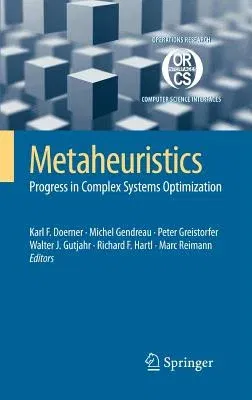Metaheuristics has grown and continues to grow steadily. Seen both from
the technical point of view and from the application-oriented side,
these optimization tools have established their value in a remarkable
story of success. Researchers have demonstrated the ability of these
methods to solve hard combinatorial problems of practical sizes within
reasonable computational time.
Highlighted in METAHEURISTICS: Progress in Complex Systems
Optimization are the recent developments made in the area of Simulated
Annealing, Path Relinking, Scatter Search, Tabu Search, Variable
Neighborhood Search, Hyper-heuristics, Constraint Programming, Iterated
Local Search, GRASP, bio-inspired algorithms like Genetic Algorithms,
Memetic Algorithms, Ant Colony Optimization or Swarm Intelligence, and
several other paradigms. In addition, a series of tutorials on
developing areas in Metaheuristics are presented in the volume. Giving
these tutorials are some of the top researchers in Metaheuristics:
Edmund Burke, Reuven Rubinstein, Eric Taillard, Gilles Pesant, Pierre
Hansen, and Stefan Voß.
Applications addressed are anticipated to include production planning,
machine and project scheduling, the traveling salesman and vehicle
routing, packing, knapsack and location problems with layout design,
portfolio selection, network-design, health care, energy and
environmental planning, data mining, pattern classification and
biotechnology, among others.
The aim of this book is to provide several different kinds of
information: a delineation of general Metaheuristics methods, a number
of state-of-the-art articles from a variety of well-known classical
application areas as well as an outlook to modern computational methods
in promising new areas. Therefore, this book may equally serve as a
textbook in graduate courses for students, as a reference book for
people interested in engineering or social sciences, and as a collection
of new and promising avenues for researchers working in this field.

